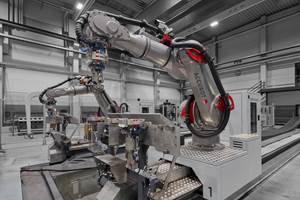Thermoset prepregs meet lightning strike protection specifications
CAMX 2024: A.P.C.M. highlights how its range of epoxy prepreg offerings undergo and surpass lighting strike testing.
Share
Panel 1 testing (left) and panel 2 testing (right) results. Source | A.P.C.M.
Adhesive Prepregs for Composite Manufacturers (A.P.C.M., Plainsfield, Conn., U.S.) has been developing thermoset epoxy prepregs for the manufacturers, designers and hobbyists of composite parts since 1992. A.P.C.M. highlights how its standard epoxy prepreg systems and substrates are available for lightning strike testing review. To achieve this, the company develops the panels and sends them for testing by the Elements Testing Group (Pittsfield Mass., U.S.).
A.P.C.M. breaks down this process. To create the test panels, the company lays up 22 plies of material, the top ply being the lightning strike carbon fiber prepreg. Complete panels are 27" × 27" and 0.20-0.22 thousands thick. Debulking, curing and paint parameters are per Boeing specifications.
Panels testing shows two panels — differentiated by the thickness and the weight of the needle punched copper foil used to make the lightning strike prepreg — prior to and after strike tests. Testing is called zone 1 and zone 2, which equates to the power of the electricity used to strike the panel. One panel had a 0.029 Ib/2ft of copper and the other 0.040 Ib/2ft of copper. Each panel experienced surface damage but maintained their structural strength and protected against lightning strikes. which can result in the shorting out any of an aircraft’s electrical components.
At its booth, A.P.C.M. is showing a high-speed video of the test being performed, as well as all of its other standard thermoset epoxy prepreg products, from 180-375°F curing systems, including specialty woven and standard woven substrates from glass to carbon fiber to Kevlar. This includes hybrid carbon fiber/colored glass, carbon fiber/Kevlar, spread tow carbon, flax and hemp. Cured and uncured samples, as well as substrates are available for attendees to view.
Related Content
-
Automated robotic NDT enhances capabilities for composites
Kineco Kaman Composites India uses a bespoke Fill Accubot ultrasonic testing system to boost inspection efficiency and productivity.
-
Determining steel/composite failure load of bonded repair assemblies
Bureau Veritas and partners use a novel equivalent interface test specimen and simulation to predict failure load in bonded composite patch repairs to steel structures.
-
Mercedes-AMG Petronas F1 Team to include sustainable carbon fiber for 2025 Formula 1 season
F1 team has taken first steps to qualify and apply sustainable composites into its W16 race car with help and innovation from industry partners and the FIA.
Related Content
Automated robotic NDT enhances capabilities for composites
Kineco Kaman Composites India uses a bespoke Fill Accubot ultrasonic testing system to boost inspection efficiency and productivity.
Read MoreDetermining steel/composite failure load of bonded repair assemblies
Bureau Veritas and partners use a novel equivalent interface test specimen and simulation to predict failure load in bonded composite patch repairs to steel structures.
Read MoreMercedes-AMG Petronas F1 Team to include sustainable carbon fiber for 2025 Formula 1 season
F1 team has taken first steps to qualify and apply sustainable composites into its W16 race car with help and innovation from industry partners and the FIA.
Read MoreSchrödinger advances materials informatics for faster development of next-gen composites
Cutting time to market by multiple orders of magnitude, machine learning and physics-based approaches are combined to open new possibilities for innovations in biomaterials, fire-resistant composites, space applications, hydrogen tanks and more.
Read MoreRead Next
Surfacing Film Incorporates LSP Into One Ready-to-Use Film
Lightning can create serious risks to the structural integrity of the aircraft and to the safety of its passengers. That’s where lightning strike protection comes in.
Read MoreCutting 100 pounds, certification time for the X-59 nose cone
Swift Engineering used HyperX software to remove 100 pounds from 38-foot graphite/epoxy cored nose cone for X-59 supersonic aircraft.
Read MoreCeramic matrix composites: Faster, cheaper, higher temperature
New players proliferate, increasing CMC materials and manufacturing capacity, novel processes and automation to meet demand for higher part volumes and performance.
Read More






